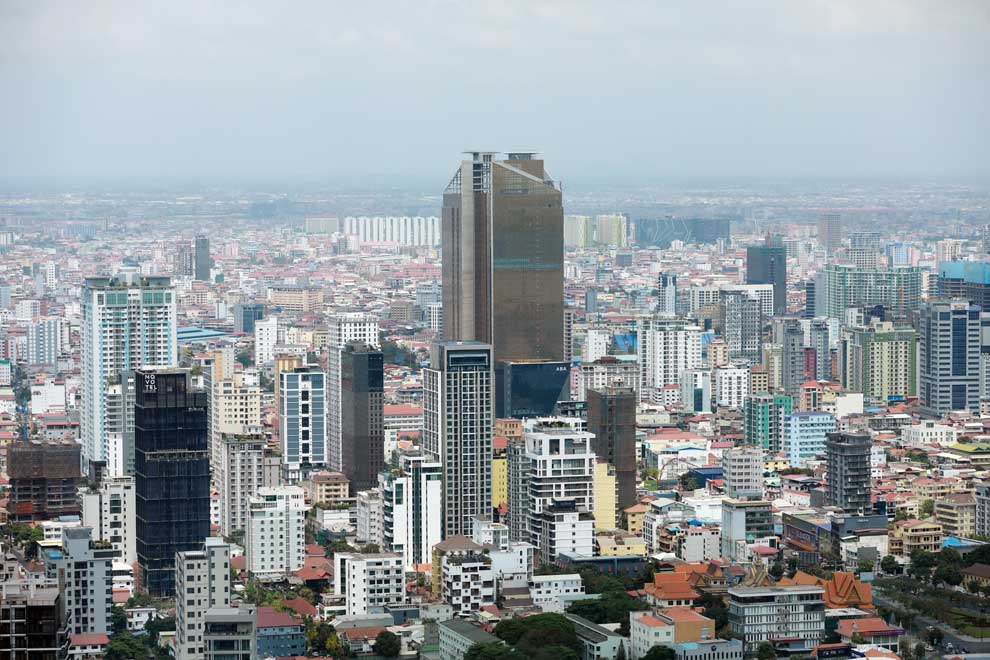
High-rise buildings in Phnom Penh, as seen on April 7. Hong Menea
The Kingdom is poised to benefit from China’s post-Covid-19 economic reopening, which is expected to partially offset a considerable slowdown in import demand from the US and European markets, as the Cambodian economy remains on track to grow by 5.8 per cent this year and 6.2 per cent in 2024, according to the International Monetary Fund (IMF).
China’s economy is “rebounding strongly … providing fresh momentum for Asia’s growth”, Krishna Srinivasan, director of the IMF’s Asia and Pacific Department (APD), told the April 2023 APD Press Briefing last week.
Srinivasan said the IMF expects Chinese demand for consumer goods to have a stronger effect on regional economic growth than that for investment goods – or capital goods – at least in the near-term, contrary to what he said has historically been the case.
The Washington-based multilateral lender has reported that other regional emerging economies are anticipated to see solid growth, although slight year-on-year slowdowns are expected.
Srinivasan opined that countries with strong trade ties with China “will benefit the most”, while those reliant on the Chinese market for tourism “will also benefit a lot”.
“Now, given the fact that this was largely a consumption-led recovery and much less so, investment side, countries which have typically benefitted from a rebound in commodity prices because of an uptick in investment-led growth in China will benefit much less this time around,” he predicted.
In response to a query from The Post, Srinivasan commented that the US and Europe – the largest buyers of Cambodian goods – “are slowing”. With roughly two- and one-fifth of the Kingdom’s exports going to the US and Europe, respectively, “those two markets are clearly affecting Cambodia’s growth”, he said.
“Our analysis suggests that [a] one per cent decline, or in US GDP [gross domestic product] growth, it leads to [a] 0.5 per cent decline in Cambodia’s growth. So, again, these are clear headwinds for Cambodia’s growth prospects,” he added, suggesting that the Kingdom diversify trading partners and export destinations.
An IMF blog – co-written by Srinivasan and Alasdair Scott, former IMF mission chief for Cambodia – underscored that “dynamic growth outlook doesn’t mean policymakers can be complacent … Intensification of the recent global financial tremors could spark others.
“Beyond these risks, persistent inflation remains a challenge. Global commodity prices have moderated after surging last year and supply chain pressures have eased, but inflation remains above central banks’ targets. Core inflation, which excludes food and energy, has also proven sticky,” it said.
‘Seize opportunities’
On January 25, Ministry of Economy and Finance permanent secretary of state Vongsey Vissoth revealed that the government had revised down its 2023 growth forecast for the Cambodian economy to 5.6 per cent versus the 6.6 per cent it put forth in October, citing uncertainty about global economic growth tied to the Ukraine conflict, climate change and Covid.
Although fallout from Covid-19 has subsided, the Ukraine crisis and climate change will put significant downward pressure on global economic growth, with the US, EU, China and other major buyers of Cambodian goods facing particularly grim prospects, he stated.
The downgraded growth forecast figure – which Vissoth affirmed had been personally approved by Prime Minister Hun Sen – is considerably greater than the 2.7-per-cent growth rate estimated for the global economy, he noted.
He argued that the Kingdom’s economic growth is underpinned by the increasing diversity in its export mix, with textile-related items accounting for a considerably smaller share than historical rates.
“To deal with these difficulties, we must minimise the negative impact, and seize opportunities for progress, because every crisis represents an opportunity,” he stressed.
Vissoth remarked that ASEAN as a whole could achieve better economic growth this year than the global average as geopolitical conflicts among major powers shift more attention and investment to the Southeast Asian bloc’s member states.
According to the finance ministry’s “Cambodia’s Macroeconomic Situation at a Glance 2022-2023” report, growth in export sectors, especially the garment sector, is tipped to decelerate to 5.5 per cent this year, due to weaker external demand, particularly from the EU market.
It predicted 11.7 per cent growth in the non-garment manufacturing sector, fuelled by food and beverages for the domestic market as well as furniture, solar items and electronic components for export.
Wholesale-and-retail trade, construction, real estate, and agriculture are expected to grow by 6.5 per cent, 1.1 per cent, 1.2 per cent, 1.1 per cent, respectively, it said, adding that the “tourism sector – hotel and restaurants – is expected to continue rising with the growth of 32.7 per cent” as regional and international travel picks up.
Year-on-year consumer price inflation is anticipated to slow down to around 3.2 per cent in 2023, as oil and other commodity prices gradually return to normal levels, it added.







